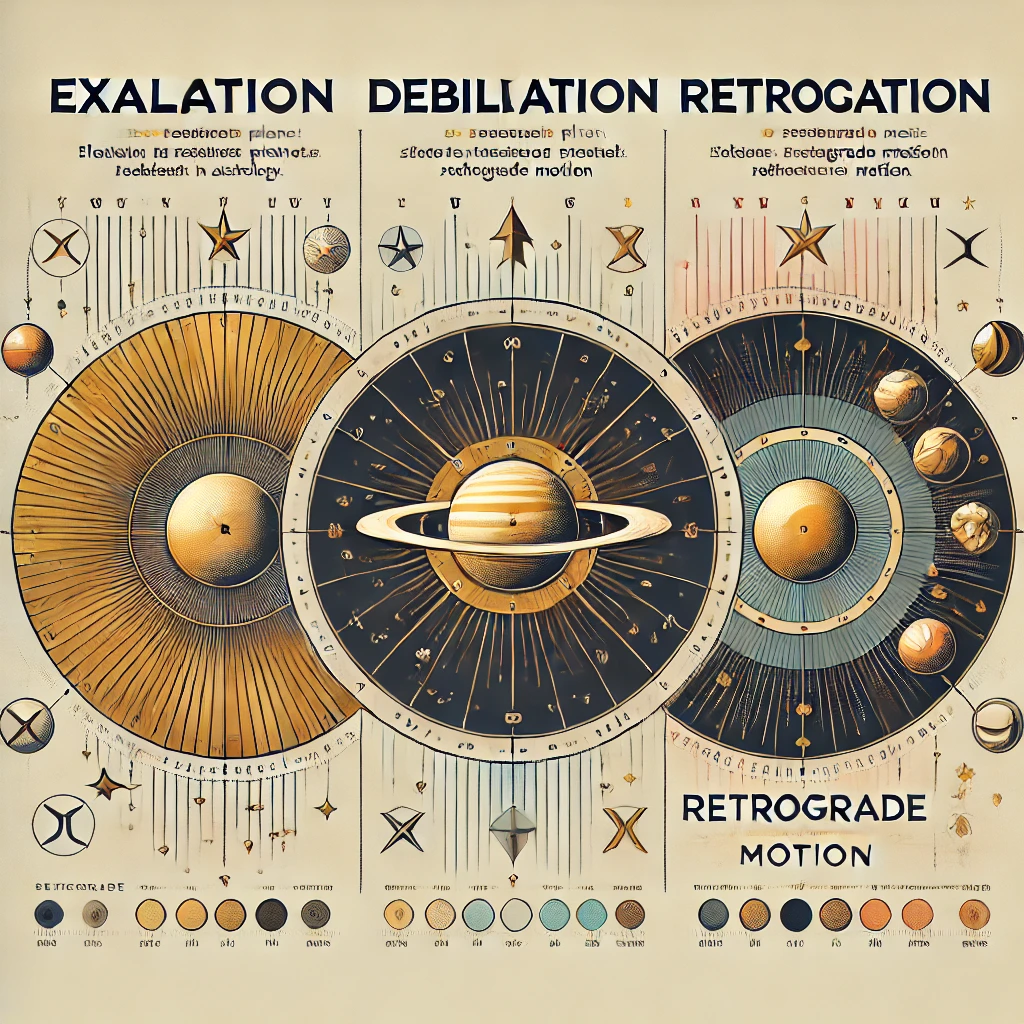Astrology is like a cosmic puzzle—once you start piecing it together, every new concept pulls you deeper. Lately, I’ve been fascinated by how planets gain or lose strength through exaltation, debilitation, and retrograde motion. These terms pop up all the time in Vedic astrology (and even Western to some extent), but what do they really mean for your birth chart or the transits shaping your life right now? Let’s break it down and unravel the mysteries—because trust me, there’s more to it than meets the eye.
What’s the Deal with Exaltation, Debilitation, and Retrograde?
First, the basics. In a birth chart, planets are like characters with unique personalities. Where they land in the zodiac—those 12 signs or rashis—determines how well they perform. An exalted planet (called uchcha in Vedic terms) is in its happy place, a sign where it thrives. Think Jupiter in Cancer: wise, generous, and flowing with good vibes. On the flip side, a debilitated planet (neecha) is in a sign where it’s out of its depth—Jupiter in Capricorn, for instance, gets bogged down by cold practicality.
These placements set the tone for how a planet’s energy shows up in your life. An exalted Venus in Pisces might make you a hopeless romantic with a flair for beauty, while a debilitated Venus in Virgo could mean overthinking love until it loses its spark. In transit charts, when planets move through these signs, they influence the world—or your personal corner of it—based on that same strength or struggle.
Then there’s retrograde motion—when a planet appears to backtrack in the sky. It doesn’t flip a planet’s status, but it adds a twist to how that energy plays out. More on that in a bit.
Are Exaltation and Debilitation Set in Stone?
Here’s a common question: can a planet be exalted or debilitated outside its assigned sign? The short answer is no—at least not traditionally. The exaltation and debilitation signs are fixed: Sun in Aries, Moon in Taurus, Mars in Capricorn, and so on. These aren’t random; they’re based on how a planet’s nature vibes with a sign’s qualities. Mercury in Virgo, for example, is a mental powerhouse because Virgo’s precision matches Mercury’s intellect.
But here’s where it gets interesting: a planet can feel stronger or weaker elsewhere due to other factors. A planet in its own house or a friendly sign might punch above its weight, even if it’s not technically exalted. Take Venus in Gemini—it’s not exalted, but Mercury’s airy curiosity can make Venus charming and witty. So, while the labels are sign-specific, the full story depends on the chart’s context.
Retrograde Motion: A Cosmic Curveball
Now, let’s talk retrograde. When a planet goes vakri (retrograde in Vedic astrology), it doesn’t lose its exaltation or debilitation status. An exalted Saturn in Libra is still exalted, and a debilitated Mars in Cancer is still debilitated. But retrograde motion shifts the flavor.
- Retrograde Exalted Planets: The strengths go inward. A retrograde exalted Jupiter in Cancer might mean deep spiritual insight that takes time to surface—or shows up in quirky, unconventional ways. It’s still powerful, just less predictable.
- Retrograde Debilitated Planets: The weaknesses get a remix. A retrograde debilitated Mercury in Pisces could mean scattered thoughts that eventually crystallize into creative genius. It’s not “fixed,” but it’s got a different rhythm—often tied to karmic lessons or delays.
Retrograde planets make you work for their gifts, whether they’re exalted or debilitated. It’s like they’re asking you to look harder at what they represent.
Exceptions: When the Rules Bend
Astrology wouldn’t be fun without some curveballs, right? While exaltation and debilitation set the foundation, other chart factors can tweak the outcome:
- Aspects: A debilitated Sun in Libra getting a boost from an exalted Jupiter’s aspect might still radiate confidence.
- Conjunctions: Pair a debilitated Mercury in Pisces with an exalted Venus, and suddenly that foggy mind turns poetic.
- House Placement: A debilitated planet in a strong house (like the 1st or 10th) can still deliver results, while an exalted one in the 8th might stumble.
- Neecha Bhanga Raja Yoga: This is the big one—a “cancellation” of debilitation. If the debilitated planet’s sign lord is well-placed or the exaltation lord steps in, that weakness flips into strength. Picture a debilitated Jupiter in Capricorn rising to prominence because Saturn’s got its back.
These exceptions don’t rewrite the rules—they just prove astrology’s a team sport. Planets don’t operate in a vacuum; they’re shaped by their cosmic crew.
Putting It All Together
So, what’s the takeaway? Exaltation and debilitation are like a planet’s starting stats—retrograde motion and chart dynamics are the gameplay. A retrograde exalted planet might introspect its way to brilliance, while a debilitated one could surprise you with resilience under pressure. It’s less about rigid labels and more about how the pieces interact.
What’s got you hooked on this cosmic dance? Are you puzzling over your own chart or just geeking out on the theory? Drop your thoughts—I’d love to keep this convo going!

Leave a Reply